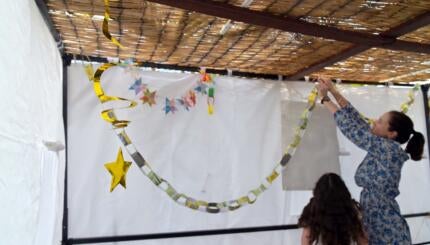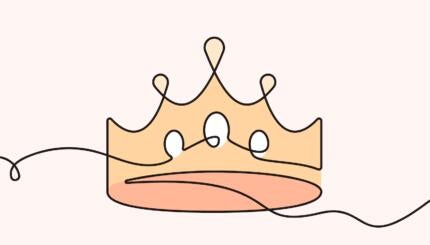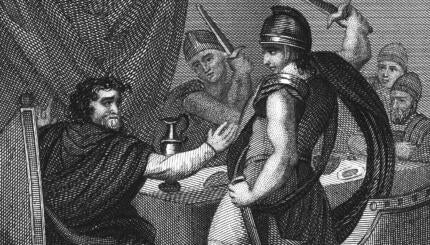In Ken Krimstein’s new graphic novel, Einstein in Kafkaland: How Albert Fell Down the Rabbit Hole and Came Up with the Universe, a real-life encounter in a Prague salon between Franz Kafka and Albert Einstein in 1911 serves as inspiration for Krimstein’s imaginative portrayal of Einstein breaking from Euclidean mathematics at Kafka’s urging, thereby defining gravity in such a way that unlocks the meaning of the universe.
Krimstein conjures a conversation between these two Jewish conjurers that pivots upon Kafka saying to Einstein, “I see everything as a battle of chance versus fate.” And in a comically brilliant illustration, Krimstein melds the two figures as one, with each uttering, “What causes accidents? Are there even such things as accidents?”
As Jews emerge from the deeply personal and introspective work of Rosh Hashanah and Yom Kippur into the collective remembrance of our emergence from Egyptian slavery during the pilgrimage festival of Sukkot, we arrive again at the beginning of the Torah and our sacred creation story of new beginnings. There is a particular joy for the Jew in reading the creation story in Genesis that perhaps derives from the playful awareness that no one truly believes the world was made as the Torah says. We’re too smart for that. After all, we invented Einstein!
Even the biblical commentator Rashi moves us off script quickly by remarking that the Torah ought to begin not when God creates the universe, but when God commands the people to observe the Passover rituals so that the redemptive act of liberation from slavery can be realized. In other words, Rashi teaches us that first and foremost, the Torah is a guide for living — not a scientific manual to be read literally. The laws meant to give structure and meaning to our random, messy and mistake-prone lives are, on a certain level, God’s admission that the transcendence of the law is the necessary corollary to the chaotic processes of creation. Or to paraphrase Krimstein’s Kafka, “Everything is an accident; and nothing happens by accident.” God creates the universe from chaos, but observance of the law is the ultimate goal for the Jew.
With your help, My Jewish Learning can provide endless opportunities for learning, connection and discovery.
The second-century sage Elazar Hakappar emphasizes this as well. While God is the creator of the universe, God’s ultimate concern is our moral behavior. For all of the seeming randomness in the land of the living, the accidental nature of our lives is no excuse for failing to give an account of our souls. As Elazar said: ““And know that all is according to the reckoning. And let not your impulse assure thee that the grave is a place of refuge for you; for against your will were you formed, against your will were you born, against your will you live, against your will you will die, and against your will you will give an account and reckoning before the King of the Kings of Kings, the Holy One, blessed be He.” (Pirke Avot 4:22)
Barely three weeks ago, the shofar blasts roused us from our moral slumber. Ten days later we afflicted our souls with fasting and prayer. These past nine days, we have rejoiced in our freedom, inhabiting the humble huts of refugees in their desert wandering. Such is the way the Jew was meant to begin a new year. By breaking ourselves down into our essential, protoplasmic selves over Rosh Hashanah and Yom Kippur, we might finally begin again on Simchat Torah with a renewed reading of Torah that brings it all back home.
In the beginning, we are random accidents designed with purpose in the image of God. We are then expelled from the Garden of Eden with the knowledge of good and evil in one hand and the deviously earned awareness of our mortality in the other. One of the descendents of creation’s first two humans commits the first murder. We are a hot mess.
Millennia later, we still are. As of this writing, more than 100 Israeli hostages remain in captivity in Gaza. Thousands of innocent Palestinians and Israelis are dead, their lives lost in the hell of war in the land of beginnings, the land of origin, for Jews, Christians and Muslims. We can escape neither our accidents nor our fates.
My teacher Arthur Hertzberg once recounted a story about a cousin who had escaped the camps and arrived at his father’s rabbinic court to share news of the destruction in Europe. He reported that among Jews headed to Nazi slaughter, some wanted to die fighting but were dissuaded by the cousin who warned them that it was the Sabbath, when fighting is forbidden. “We must face our fate singing,” he told them, “because the Torah is greater than we are.”
This paradox — that the human is made in the Divine image, that each life is unique and radically valuable, and that to die as a Jew is to sublimate oneself to the eternality of God’s plan — is one of Judaism’s most difficult truths. It runs completely counter to our American ethic that individual rights are sacred. Rabbi Hertzberg’s story, an unforgettable testimony of human resilience in the face of unspeakable horror, sublimates the accidental self to the notion of collective purpose. This countercultural message feels especially necessary in our day.
On this Shabbat of beginning, I pray those who are captive can hear songs of redemption. I pray those injured might heal. I pray those wronged might forgive. I pray those making war might one day make peace.
We end the first weekly Torah reading by recounting the lineage of Noah, presaging next week’s reading of the story of the flood, in which all the flotsam and jetsam of divinely created randomness is washed away. It’s only when the destroying waters ebb that a new world and a new promise brings us to the search for the new land.
This article initially appeared in My Jewish Learning’s Shabbat newsletter Recharge on October 26, 2024. To sign up to receive Recharge each week in your inbox, click here.



